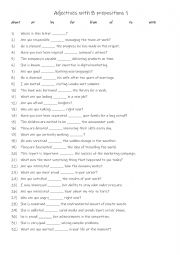
|
A2-B1 Adjectives with prepositions
Students complete the gap-fill with the correct preposition. Answers on page 2.
Level: elementary
Age: 11-100
Type: worksheet
Downloads: 110
|
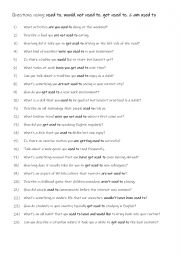
|
Questions using: used to, would, not used to, get used to, & am used to
This worksheet is suitable forstudents at CEFR LEVEL B1+ to C1. Students in small groups or pairs, use the questions as a springboard to talk about adapting to change.
Level: advanced
Age: 12-100
Type:
Downloads: 113
|
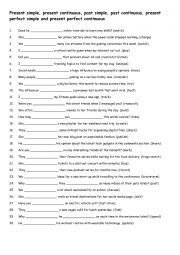
|
A1+-A2 Practise with comparatives and superlatives 2
Students read the sentence and complete the sentence with the correct form of the given adjective in (). Each form is used 13 times! Answers on page 2.
Level: elementary
Age: 8-100
Type:
Downloads: 105
|
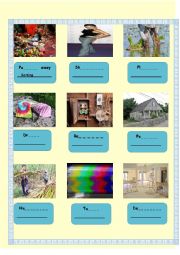
|
What needs to be done? Part 2 of 5
Students to complete the verb then make sentences (oral or written) using need/s + verb ing for each picture. For higher level students where possible they think of another suitable synonym which could also be used. See example on first picture.
Level: elementary
Age: 9-100
Type: activity-card
Downloads: 266
|
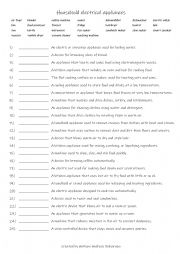
|
A1+-A2 25 Household electrical appliances
First, students need to familiarise themselves with the 25 words and their meanings Then they read the definitions to see which one is being described and write that word in the space provided. Answers on page 2.
Level: elementary
Age: 8-100
Type:
Downloads: 110
|
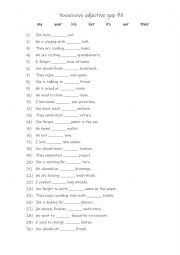
|
Possessive adjective gap fill practise
Students read the sentences and identify the subject to see which possessive adjective is required to complete each sentence. Suitable for A1-A2 level students.Answers on page 2
Level: elementary
Age: 9-100
Type:
Downloads: 101
|
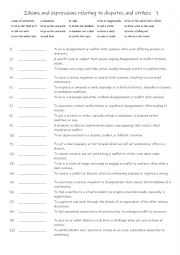
|
B1+-C1 Idioms and expressions relating to disputes and strikes 1
First, students need to familiarise themselves with the 20 idioms and expressions and their meanings. Then they read the definitions to see which one is being described and write that word in the space provided Answers on page 2.
Level: intermediate
Age: 12-100
Type:
Downloads: 111
|
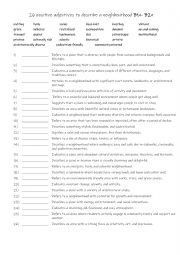
|
Positive adjectives to describe a neighbourhood B1+- B2+
26 positive adjectives to describe a neighbourhood B2-C1. Students read the definitons and choose from a list of adjectives in bold. Answers on page 2 After checking the answers, students in pairs or small groups use some of the adjectives to describe their neighbourhood.
Level: advanced
Age: 12-100
Type: worksheet
Downloads: 125
|
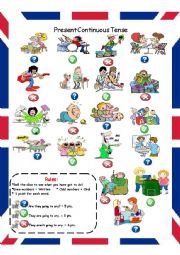
|
Present Continuous Tense
An enjoyable speaking and writing supplement to reinforce asking questions, answering using both affirmative and negative sentences. To get a mixture of both oral and written work I normally have something small enough to hide in my hand. If the object is in the hand not selected, they have to write the sentence. To encourage students, I usually gi...
Level: elementary
Age: 9-100
Type: worksheet
Downloads: 276
|
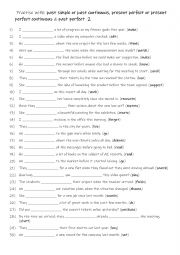
|
A2+-B1 Practise with past simple or past continuous, present perfect or present perfect continuous & past perfect 2
Students should practise past simple, past continuous, present perfect, present perfect continuous, and past perfect to communicate more precisely about different timeframes, actions, and experiences. These tenses help in narrating events, linking the past with the present, and describing ongoing actions. They improve fluency, enable clearer conver...
Level: intermediate
Age: 9-100
Type:
Downloads: 120
|












